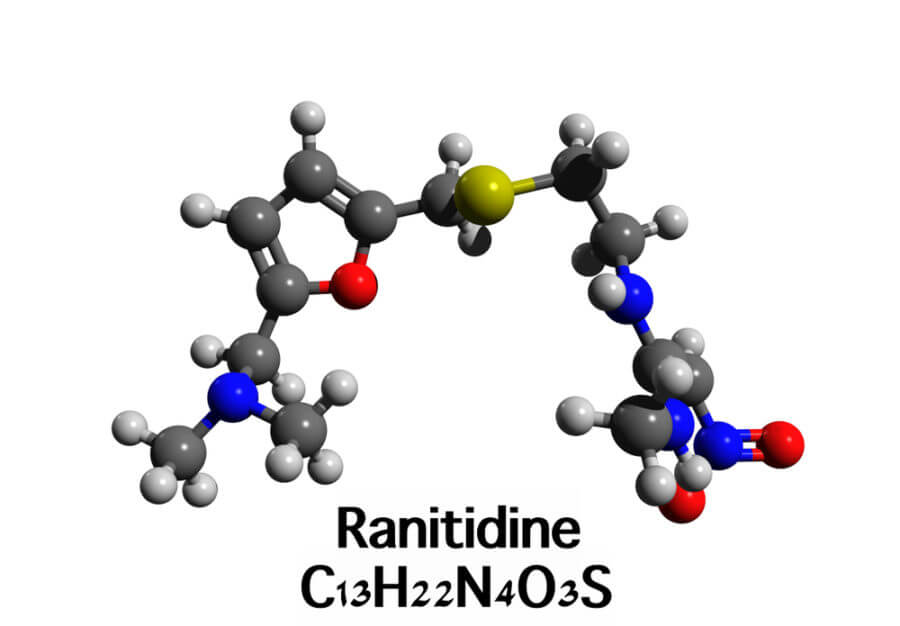
On April 1, 2020, the US Food & Drug Administration announced that manufacturers should pull all prescription and over-the-counter drugs containing the active ingredient ranitidine from the market. This move follows their finding in September of 2019 that ranitidine, the active ingredient in Zantac and other heartburn medications, contains unacceptable amounts of the cancer-causing chemical N-nitrosodimethylamine (NDMA).
Throughout testing of both generic drugs containing ranitidine and the name brand Zantac, the FDA reported “unacceptable levels of NDMA.” The FDA defines these amounts as being 96 nanograms or more per pill. Since announcing the discovery, the FDA has also formally requested all producers of the drug expand their testing for NDMA and report any amounts that exceed the 96 ng baseline. In cases where patients have suffered harm due to prolonged exposure to NDMA-contaminated ranitidine, legal claims, including those involving medical malpractice, may arise if healthcare providers failed to warn or properly monitor their patients.
What is Ranitidine?
Ranitidne is a medication used to reduce stomach acid production. Usually taken once or twice a day, the chemical works for the treatment of:
- heartburn
- acid reflux
- gastroesophageal reflux disease (GERD)
- Peptic ulcer disease
- Zollinger-Ellison syndrome
As ranitidine is a fairly common medication for those suffering from acid reflux and indigestion, we wanted to provide you with information on what the FDA recall of Zantac and other drugs means for those who took the medications.
Speak with a personal injury lawyer today. Call: 317-488-5500
What is NDMA and Why Is It In Ranitidine?
NDMA is a product of industrial and environmental waste, one which has been found in water supplies and food products over the years, including dairy, vegetables, and grilled meats. It is technically classified as a “probable carcinogen” by the Environmental Protection Agency, meaning that it is capable of modifying DNA to cause the growth of cancer cells.
Originally produced as a research chemical, NDMA was once used to create rocket fuel. However, this was discontinued after high levels of the chemical were found in the air following takeoffs.
Since the recall of ranitidine, scientists have studied the effect that the medicine has on the body. Though the leading belief is that ranitidine reacts with bodily enzymes to create NDMA, studies have remained inconclusive. Another theory is that ranitidine may be unstable, breaking down easily in the body, and eventually becoming NDMA. In either case, though, NDMA is rapidly and heavily absorbed into the body, as opposed to being excreted through urine. This is especially important, as this means longer exposure to the carcinogen.
Complete a Free Case Evaluation form now
How Does NDMA Cause Cancer and Disease?
Once absorbed into the body, NDMA poses danger in three major ways:
Click to contact us today
Promotes new cancers
Though it’s a low-level carcinogen, exposure to NDMA has the potential to cause cancers in the stomach, small intestine, colon, esophagus, and liver. These are the primary forms of cancer potentially caused by the chemical, but there are additional types that may arise:
- Multiple myeloma
- Non-Hodgkin Lymphoma
- Ovarian cancer
- Pancreatic cancer
- Prostate cancer
- Testicular cancer
- Uterine cancer
Aggravates pre-existing cancer diagnoses
For individuals who have previously been diagnosed with cancer, NDMA can worsen those symptoms and even cause the reappearance of cancers once in remission. There are some risk factors that worsen the probability of this happening, primarily having previously received radiation in the abdomen, brain, colon, esophagus, or nasal areas.
Lowers efficacy of cancer treatments
If someone has been taking Zantac for over a year, and is currently undergoing cancer treatments, NDMA may significantly lessen the effects of these processes. It may also cause further complications, as NDMA has also been found to cause non-cancerous health issues in lab animals, such as severe liver disease, birth disorders, and even death.
If you or a loved one believe you were affected by ranitidine in any of these ways, don’t worry about the “what if.” Contact the Indianapolis dangerous drug attorneys at Christie Farrell Lee & Bell to share your story with an expert and learn your options. Dial 317-488-5500 or reach out to us online today to get started.
Call 317-488-5500 or complete a Free Case Evaluation form



